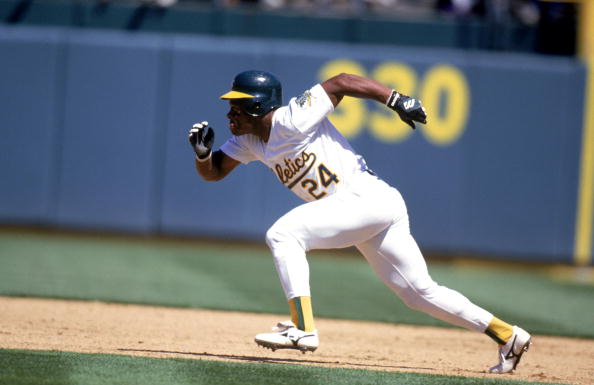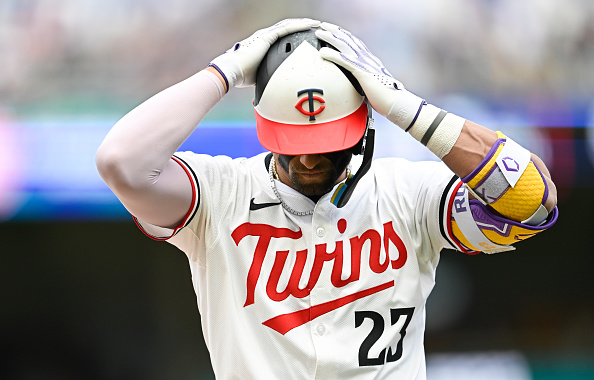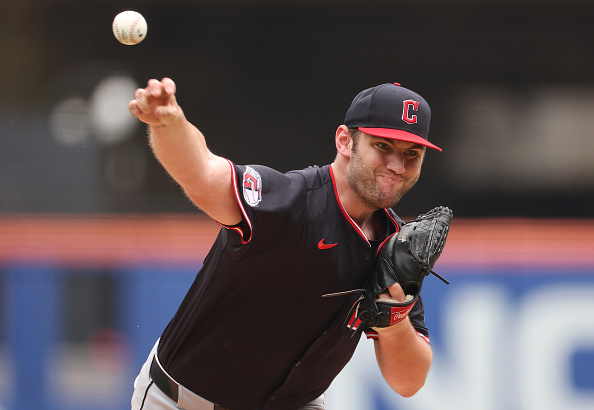The Oakland Athletics franchise began in Philadelphia and was actually quite successful in its early years. From 1901-1931, the team appeared in eight World Series, winnings five of them. Then, in 1932, they finished second in the AL, in 1933, they were third, and from 1934-1954 the Philadelphia A’s didn’t see finish higher than fourth. Their next 13 years were spent in Kansas City and the A’s didn’t hit the .500 mark once.
In 1968, the franchise moved to Oakland and quickly started playing better baseball. They won three consecutive World Series from 1972-1974 and were a solid team for the most part in the late ’70s and through the ’80s. From 1988-1990, they again made three World Series and won in 1989. Since 1991, Oakland has made the postseason 12 times but has yet to represent the American League again. With multiple periods of success and nine championships in all, let’s take a look at what the Athletics’ All-Time 26-Man roster looks like.
Make sure to check out all of our other All-Time Rosters.
Starting Nine
Mickey Cochrane, C
Gordon Stanley Cochrane made his debut in 1925 and immediately showed he could hit batting .331 with an .845 OPS. After a slightly down year in 1926, Mickey established himself as a premier catcher. From 1927-1933, the left-handed hitter slashed .326/.419/.505 while catching 84% of the team’s games. He took home the AL MVP award in 1928 and led the A’s to championships in 1929 and 1930. Cochrane had an impressive 35.1 fWAR over those seven seasons and was inducted into the Hall of Fame in 1947.
Jimmie Foxx, 1B
Foxx was one of the best hitters in the history of the game. He debuted as a 17-year-old in 1925 and went 6-for-9 that season as a pinch-hitter. Over the next couple of seasons, the right-handed slugger played catcher, third base, and outfield before settling in at first base. Finally, in a defensive home, Foxx crushed pitching from 1929-1935 to the tune of a .341/.444/.655 slash with a ridiculous .481 wOBA and 173 wRC+. He averaged 139 RBIs during that time and won the triple crown in 1933.
In 1932, Foxx won his first of two consecutive MVP awards in his most impressive season. That year he had 50 HRs, 150 runs, and 150 RBIs which remains one of only three such seasons ever with the other two accomplished by Babe Ruth. Foxx also had an 11.3 fWAR in 1932 which is the second-highest ever by a first baseman trailing only Lou Gehrig‘s 12.5 in 1927. The Maryland native was inducted into Cooperstown in 1951.
Eddie Collins, 2B
When the A’s were taking home their first three championships, Collins was the star. In the six-year stretch from 1909-1914 that saw Philadelphia go to four World Series and win three, the second baseman had an incredible 52.1 fWAR. He averaged 60 stolen bases per season and led the league with 81 in 1910. Collins finished top three in MVP voting three times and won the award in 1914. He was elected to the Hall of Fame in 1939.
Sal Bando, 3B
Campaneris’ partner on the left side of the infield had an excellent nine-year stretch from 1968-1976. Bando averaged 21 HRs and 88 RBIs during that time with a .357 wOBA and 130 wRC+. He was also about as durable as they come playing in 150+ games in all of those seasons except one when he took the field 146 times in 1974. Bando walked more than he struck out as well which was uncommon for someone with his power at the time.
Bert Campaneris, SS
Campaneris is fondly remembered for playing all nine positions on September 8, 1965. He was also a premier base stealer in his time leading the AL six times over an eight-year span from 1965-1972. While not an offensive juggernaut, Campy did hit .262 in his 13-year career with the A’s and was an excellent defensive shortstop contributing 62 runs above average. He also batted a solid .273 in the playoffs during Oakland’s three-peat.
Rickey Henderson, LF
The greatest leadoff hitter of all time, Henderson holds stolen base records that are nearly impossible to break. Rickey had four different stints with Oakland but in total, he stole 867 bases with the A’s. In a five-year stretch from 1980-1984, he averaged 92 SBs per year including three seasons over 100 while setting the likely unbreakable record of 130 in 1982. Possibly even more impressive is that Henderson won his first SB title in 1980 with 100 and then finished his A’s career in 1998 while winning the crown again with 66 swipes at the age of 39. He was inducted into the Hall of Fame in 2009.
Al Simmons, CF
Simmons played mostly left field but I am putting him here to get his bat in the lineup. In his first run with the Athletics from 1924-1932, the right-handed hitter slashed .358/.400/.590 while blasting 208 homers while averaging 129 RBIs per season. He finished in the top five in MVP voting four times. In 1925, Simmons had 253 hits which remains the single-season record for a right-handed batter. He also hit .333 and swatted six homers in World Series play for the A’s. Simmons was inducted into the Hall of Fame in 1953.
Reggie Jackson, RF
Reggie always swung for the fences and while he holds the all-time record with 2,597 strikeouts, he also blasted 563 HRs. 269 of them came as a member of the A’s. He led the league in 1973 and 1975 while also taking home the AL MVP award in 1973. To cap off that season, Jackson was also the World Series MVP going 9-for-29 with a home run and six RBIs. He was a threat on the bases as well with 145 stolen bases during his time with the A’s. Reggie made it to Cooperstown in 1993.
Mark McGwire, DH
Big Mac made an immediate impact blasting a rookie-record 49 HRs in 1987, which stood for 30 years. He won the ROY award and finished sixth in AL MVP voting. He would also lead the league in home runs his last full season in Oakland in 1996 with 52 bombs. Altogether, he blasted 363 for the A’s with a wOBA of .401 and a wRC+ of 151. Although he is known for the memorable HR chase of 1998, he played nearly 800 more games in Oakland and is the all-time franchise leader in home runs.
Starting Rotation
Lefty Grove, LHP
The most dominant pitcher of his era and an all-time great, Robert Moses Grove pitched the first nine years of his career with Philadelphia. From 1925-1933, the southpaw led the league in ERA five times, strikeouts seven times, and wins four times. In 1930, he won the pitching triple crown and followed it up in 1931 with another one and an MVP award. In his postseason career, Grove had an excellent 36/6 K/BB rate along with a 1.75 ERA. He regularly came in to close games as well racking up 50 saves and leading the league with nine in 1930. His ERA+ of 217 in 1931 is the fifth-best mark of any AL pitcher with more than 250 innings in a season. Grove was elected to the Hall of Fame in 1947.
Eddie Plank, LHP
At the turn of the century, pitching was controlling the game across the league. Nevertheless, Plank was one of the best. In his 14 years with the Athletics, the southpaw had a minuscule 2.39 ERA and won 284 games. He accomplished that with impeccable control as he maintained a 5.9 percent walk rate. The lefty also kept the ball in the yard. Even though it wasn’t a power-hitting era, Plank still only allowed one homer to every 415 batters. He was inducted into the Hall of Fame in 1946 by the Old Timer’s committee.
Rube Waddell, LHP
Although Waddell only pitched for the A’s from 1902-1907, he made his mark. The southpaw won 131 games and led the AL in strikeouts each year he pitched in Philadelphia. He struck out 349 batters in 1904 and that remained the modern-day single-season MLB record until Sandy Koufax broke it in 1965. The following year he won the triple crown with a 1.48 ERA and 27 wins and 287 K’s. He was elected into Cooperstown in 1946 by the Old Timer’s Committee.
Vida Blue, LHP
Another lefty in the rotation here as Blue began his career with a bang. In his first full season with Oakland in 1971, he won the CYA and the MVP going 24-8 with a 1.82 ERA and 301 strikeouts. Of course, he is the last switch-hitter to win the AL MVP award. From 1971-1976, Blue won 107 games and had a 2.72 ERA. He averaged 264 IP in that span and helped the A’s to three consecutive World Series and five consecutive pennants.
Catfish Hunter, RHP
The right-handed complement to Blue, Hunter pitched similarly from 1967-1974. In those eight seasons, Catfish had a 2.98 ERA and won 144 games for the Athletics. Where Hunter really shined was in the postseason. For Oakland, he went 7-2 and had a 2.55 ERA in 88.1 innings. In his final year with the A’s, Hunter won the CYA with a league-leading 2.49 ERA and 25 wins. He was elected to the Hall of Fame in 1987.
Bullpen
Dennis Eckersley, RHP (closer)
This choice is a no-brainer. Eckersley was one of the most dominant closers in his stint with the A’s. Originally a starting pitcher with the Red Sox, Eck was converted to a reliever when he got to Oakland in 1987 by Tony La Russa. The right-hander had a five-year stretch for the ages from 1988-1992. In that time, he saved 220 games, had a 1.90 ERA, and was actually 24-9 out of the bullpen. Eck also had nearly a 10-to-1 K/BB rate and a ridiculous 0.792 WHIP. He finished in the top six in CYA voting four times and took home the award along with the AL MVP in 1992 when he led the league with 51 saves. He is first in franchise history with 320 saves and was inducted into the Hall of Fame in 2004.
Rollie Fingers, RHP
The man with the handlebar mustache could also close games although when he was with Oakland he also pitched multiple innings. In a six-year stretch from 1971-1976, Fingers averaged 66 appearances and 125 innings pitched, leading the league in appearances twice. During that time he held a 2.59 ERA and saved 122 games. He also shined in the postseason with a 2.22 ERA and eight saves with Oakland during their championship runs. Fingers was the 1974 WS MVP and was inducted into the Hall of Fame in 1992.
Charles Bender, RHP
We have to have Chief on the team so I will put him in the bullpen as he did come in for relief 97 times during his days with Philadelphia. In his 12 seasons with the A’s, Bender had a 2.32 ERA and won 193 games. He could be interchanged with Hunter as he was a better pitcher overall, but he is very valuable here as a long relief man or spot starter.
Huston Street, RHP
Street came into the majors as a closer having done so for Texas in college. Although he played for four teams in his career, he appeared in the most games for Oakland where he started. From 2005-2008, Street had a 2.88 ERA, struck out over a batter per inning, and saved 94 games for the A’s. In 1913 he actually won 21 games while leading the league with 13 saves.
Paul Lindblad, LHP
Let’s get a reliable lefty in here as well. Lindblad played for 11 years with the A’s over two different stints. In his second stint from 1973-1976, he had a 2.84 ERA and appeared in 214 games. Overall, he had a 3.29 ERA, saved 41 games, and averaged nearly two innings per relief appearance.
Rick Honeycutt, LHP
Honeycutt was another starter who La Russa turned into a reliever. From 1988-1993, the lefty had a 3.04 ERA. In an offensive environment at the time as well, the southpaw’s ERA+ was 126 and he allowed only 20 home runs in 338 innings.
Sean Doolittle, LHP
Let’s get one more lefty in the bullpen. Doolittle started his career with the A’s and although he was the closer for only one season, he put up very good numbers. In his six seasons in Oakland, the southpaw had a 3.09 ERA and an impressive 300/47 K/BB rate while keeping his WHIP at 0.929.
Bench
Bob Johnson, LF
Johnson was an underrated player and came to Philadelphia in 1933 after their winning seasons. Already 27 years old when he made his debut, he had an excellent 10 seasons with the A’s. The right-handed slugger averaged 25 HRs and 104 RBIs from 1933-1942 while slashing .298/.395/.520. He put up 44.3 fWAR and deserves another look by the Hall of Fame. For more on that, check out Johnson and some other snubs here.
Home Run Baker, 3B
Baker was a home runs hitter, just not by modern standards. He led the AL in bombs four years in a row from 1911-1914. During those four seasons, he also led in RBIs twice, batted .334, and stole 131 bases. He was a menace to pitchers and one of the first power-speed combo guys.
Jose Canseco, RF
You can’t have one Bash Brother without the other. Canseco was the first player to have a 40-40 season in 1988 and won the AL MVP award only two years after winning the AL ROY award. In 1991, he led the league in homers again, this time with 44 and he finished fourth in MVP voting. In his Oakland career, the slugger hit 254 homers, stole 135 bases, and posted an .851 OPS.
Jason Giambi, 1B
Giambi took over for McGwire and from 1996-2001, the lefty averaged 30 HRs a year while adding the 2000 AL MVP to his resume. In that time he slashed an impressive .311/.415/.553 and drove in 108 runs per year. He finished second in 2001 to Ichiro in the MVP race by just eight points despite having a 1.5 rWAR lead on the Seattle outfielder.
Eric Chavez, 3B
The left-handed-hitting third baseman gets overlooked sometimes because of the likes of McGwire and Canseco, then Giambi and Tejada. Chavez though absolutely belongs here. From 2000-2006, he had an .847 OPS and blasted 199 homers. He also won six Gold Gloves in those seven years.
Honorable Mentions
Harry Davis, OF
Max Bishop, 2B
Carney Lansford, 3B
Eddie Rommel, RHP
Miguel Tejada, SS
Matt Chapman, 3B
Check us out on our socials:
Twitter: @PTSTNews and @TalkPrimeTime
Facebook Page: Prime Time Sports Talk
Join our Facebook Group: Prime Time Sports Talk
Instagram: @ptsportstalk
Follow Johnnie Black on Twitter @jball0202
Main Image Credit: Embed from Getty Images








One Response